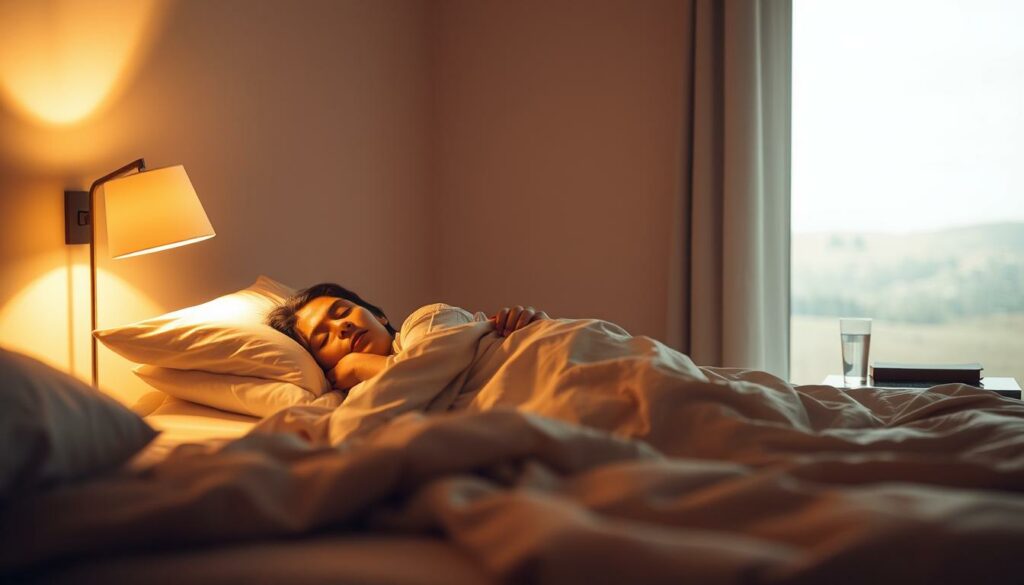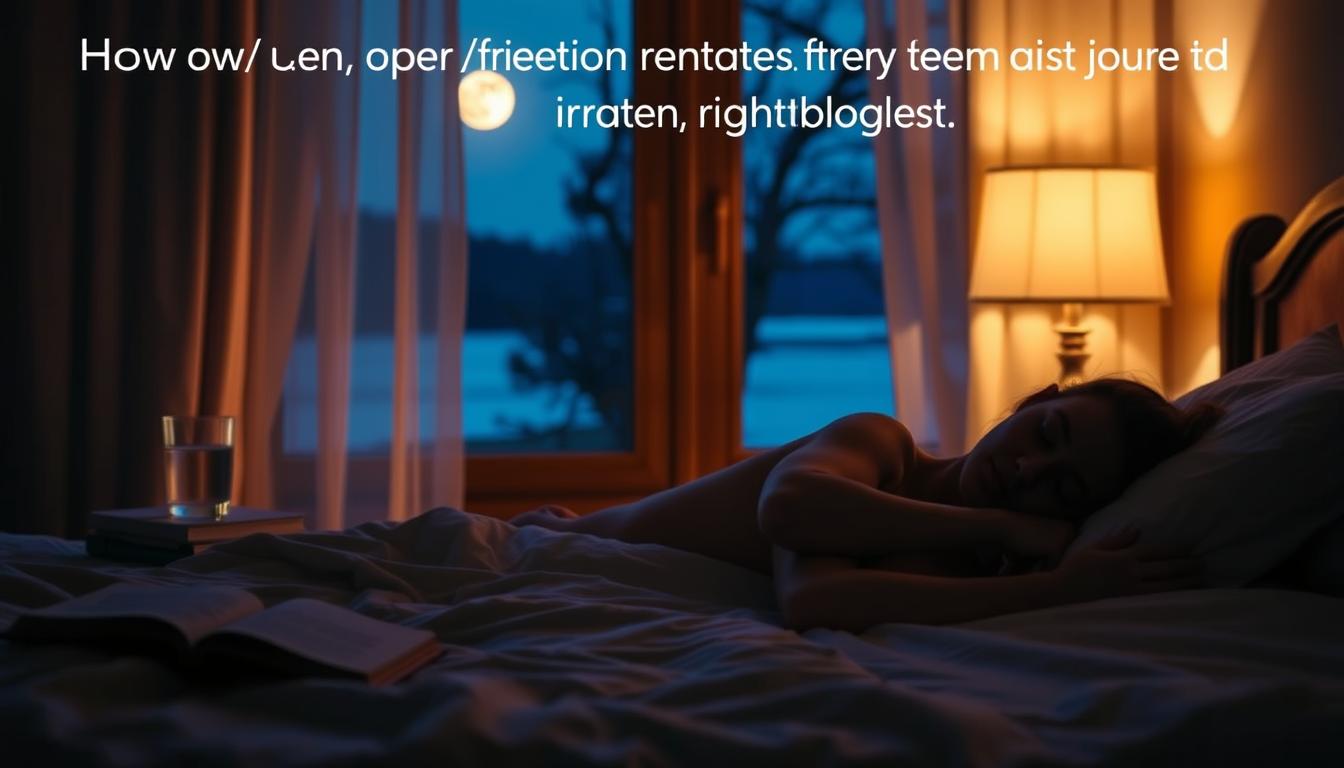Are you having trouble losing weight? You might not know that getting enough sleep is key. Studies show that sleeping well can help you lose pounds.
Not sleeping enough messes with your hunger hormones. This makes you want unhealthy foods more. It can stop you from reaching your goal of being healthier and lighter.
Make sleep a priority and stick to a regular sleep schedule. This helps your body lose fat naturally. Add a healthy diet and exercise, and you’re on your way to a better life.
Key Takeaways
- Getting enough rest is key for weight loss
- Lack of sleep messes with hunger hormones, leading to unhealthy cravings
- Prioritizing rest supports the body’s natural fat loss processes
- A consistent sleep schedule is key to a healthier lifestyle
- A balanced diet and regular exercise complement rest for optimal results
The Sleep-Weight Connection: Understanding the Science
Sleep is key to managing weight, affecting how we metabolize food. Lack of sleep messes with our body’s energy processing, leading to changes in how we store and use energy.
How Sleep Deprivation Affects Your Metabolism
Not getting enough sleep can really mess with your metabolism. It affects how well you handle blood sugar and your metabolic rate.
The Impact on Insulin Sensitivity
Insulin sensitivity is vital for handling glucose. Sleep deprivation can lower insulin sensitivity, making it tough for glucose to get into cells. This leads to higher blood sugar levels.
Metabolic Rate Changes During Sleep Deprivation
Sleep loss can also change your metabolic rate. Research shows that long-term sleep loss can lead to weight gain.

The Research Behind Sleep and Weight Management
Many studies have looked into how sleep affects weight. These findings help us understand how to manage weight better.
Key Studies and Their Findings
Studies show a strong link between sleep and weight. For instance, a study in SLEEP found that shorter sleep is linked to higher BMI.
| Study | Sample Size | Key Finding |
|---|---|---|
| Study 1 | 1000 participants | Short sleep duration associated with higher BMI |
| Study 2 | 500 participants | Sleep deprivation led to decreased insulin sensitivity |
| Study 3 | 2000 participants | Optimal sleep duration linked to better weight management |
What Science Reveals About Sleep Duration and Body Weight
The science is clear: sleep is vital for weight management. Getting enough sleep is key to staying healthy. Scientists are working to understand how sleep and weight are connected.
Sleep More, Weigh Less: The Truth About Fat Loss
How much and how well you sleep can really affect your weight loss. It’s key to understand how sleep impacts weight management to reach your goals.
Why Sleep Quality Matters as Much as Quantity
Sleep isn’t just about how long you sleep. It’s also about how well you sleep. Bad sleep quality can mess with your body’s weight management processes.
Sleep Cycles and Their Role in Recovery
Sleep cycles, like REM and non-REM sleep, are vital for recovery. They help your body fix tissues, build muscle, and boost your immune system.

To better your sleep quality, first, understand it. Track your sleep patterns, like how long it takes to fall asleep and how often you wake up.
The Optimal Sleep Duration for Weight Management
Sleep quality is important, but so is how long you sleep. Sleeping too little or too much can hurt your weight loss efforts.
Finding Your Personal Sleep Sweet Spot
Everyone sleeps differently. Find your best sleep time by trying different lengths and seeing how you feel.
Consistency vs. Duration: What Matters More
Keeping a regular sleep schedule is as important as the length. Irregular sleep can mess with your body’s clock, making weight loss harder.
Comparison of Sleep Duration and Weight Loss Outcomes
| Sleep Duration | Weight Loss Outcome | Health Impact |
|---|---|---|
| Less than 5 hours | Negative impact on weight loss | Increased risk of chronic diseases |
| 7-9 hours | Optimal for weight management | Improved overall health |
| More than 9 hours | Potential negative impact on weight loss | Mixed health outcomes |
How Sleep Deprivation Sabotages Your Weight Loss Goals
Lack of sleep can harm your weight loss goals in many ways. It messes with your body’s hunger hormones, making you crave more food. It also leads to bad food choices.
The Hunger Hormone Imbalance: Ghrelin and Leptin
Sleep loss changes the balance of two important hunger hormones: ghrelin and leptin. Ghrelin makes you hungry, while leptin helps you feel full.
How Ghrelin Increases When You’re Sleep-Deprived
Not getting enough sleep raises your ghrelin levels. This makes you hungrier and more likely to eat too much. Dr. Andrew Huberman says, “Sleep loss boosts ghrelin, making you want to eat more and gain weight.”
Leptin Resistance and Its Effects on Satiety
Sleep loss also makes your brain less responsive to leptin. This means you feel less full and eat more. A study in the Journal of Clinical Endocrinology and Metabolism found sleep-deprived people had lower leptin and higher ghrelin. This led to more hunger and appetite.
Increased Cravings and Poor Food Choices
Sleep loss affects hunger hormones and makes you crave unhealthy foods. It also makes you make bad food choices.
Why You Crave Carbs and Sugar When Tired
When tired, your body wants quick energy from carbs and sugar. This is because your brain is trying to make up for the energy lost from not sleeping enough.
“The brain’s reward system is altered when we’re sleep-deprived, making us more likely to seek out high-calorie, high-reward foods,”
says Dr. Kelly McGonigal, a health psychologist.
Decision Fatigue and Willpower Depletion
Sleep loss also weakens your willpower and decision-making. This makes it harder to resist unhealthy foods. So, you’re more likely to give in to temptations and make bad food choices.
Creating Your Sleep-Optimized Weight Loss Plan
To make a sleep-optimized weight loss plan, you need to look at your sleep habits. You should set achievable goals and find ways to sleep better.
Step 1: Assess Your Current Sleep Patterns
First, learn about your sleep habits. Use sleep trackers and keep sleep diaries. These tools show how long and well you sleep, helping you see what to improve.
Using Sleep Trackers and Sleep Diaries
Sleep trackers and diaries collect data on your sleep. They reveal trends and patterns that affect your sleep. For example, a tracker shows sleep stages, while a diary tracks your sleep schedule and what might disturb it, like caffeine or screens before bed.
Identifying Your Sleep Disruptors
After tracking your sleep, find out what disrupts it. Stress, irregular sleep times, and environmental factors like noise or light are common disruptors. Knowing what affects your sleep lets you take steps to fix it.
Step 2: Set Realistic Sleep and Weight Loss Goals
After checking your sleep habits, set achievable goals for better sleep and weight loss. Make gradual sleep schedule changes and match your weight loss goals with your sleep improvements.
Gradual Sleep Schedule Adjustments
Changing your sleep schedule slowly helps your body adjust. For instance, if you sleep at 2 AM and want to sleep at 10 PM, don’t try to switch right away. Instead, move your bedtime by 15-30 minutes every few days until you reach your goal.
Aligning Weight Loss Expectations with Sleep Improvements
Also, match your weight loss goals with your sleep improvements. As your sleep gets better, so will your weight loss. Setting realistic goals that match your sleep progress keeps you motivated.
Step 3: Implement Sleep-Enhancing Strategies
It’s key to use strategies that improve your sleep for weight loss. This includes creating a sleep schedule and monitoring progress to adjust as needed.
Creating a Sleep Schedule
Having a regular sleep schedule helps your body’s internal clock. Go to bed and wake up at the same time every day, even on weekends, to keep a consistent cycle.
Monitoring Progress and Making Adjustments
Keep track of your sleep progress and adjust as necessary. Use your sleep trackers and diaries to see what works and what doesn’t. Then, change your strategies to better your sleep and support your weight loss.
| Step | Action | Expected Outcome |
|---|---|---|
| 1 | Assess Current Sleep Patterns | Understanding sleep quality and disruptors |
| 2 | Set Realistic Goals | Gradual improvements in sleep and weight loss |
| 3 | Implement Sleep-Enhancing Strategies | Improved sleep quality and weight loss progress |
Designing Your Bedroom for Better Sleep and Weight Loss
Improving your bedroom for sleep can greatly help your sleep and weight loss. A well-designed bedroom creates a restful sleep environment. This is key for managing weight.
Temperature, Light, and Noise Control
It’s important to control the bedroom’s temperature, light, and noise. Temperature is a big factor in sleep quality.
Finding Your Optimal Sleep Temperature
Studies say the best sleep temperature is 60-67 degrees Fahrenheit. Try different temperatures to see what works for you.
Blackout Solutions for Light Pollution
Blackout curtains or shades block out light. This is great for those who sleep during the day or live in bright areas.
Selecting the Right Mattress and Pillows
The right mattress and pillows are key for good sleep. A good mattress offers the right support and comfort.
Mattress Types and Their Impact on Sleep Quality
There are many mattress types, like memory foam or innerspring. The best one depends on your sleep style and preferences.
Pillow Selection Based on Sleep Position
Choosing the right pillow is important. Side sleepers need a firmer pillow, while back sleepers prefer a softer one.
Creating a Sleep Sanctuary
Turning your bedroom into a sleep sanctuary is more than just adjusting the environment. It’s also about creating a calm atmosphere.
Decluttering for Better Sleep
A cluttered room can be stressful. Cleaning up your bedroom makes it more peaceful and sleep-friendly.
Aromatherapy and Other Sleep Aids
Aromatherapy and sleep aids like white noise machines can improve your sleep. Scents like lavender can help you relax and sleep better.
Evening Routines That Promote Sleep and Fat Loss
Creating a good evening routine can really help you sleep better and lose weight. A well-planned evening routine helps you sleep well. This is key for managing your weight and staying healthy.
The Ideal Pre-Sleep Meal Timing and Composition
Eating a balanced meal in the evening can help you sleep better and aid in weight loss. It’s important to eat at the right time and choose the right foods.
Foods That Help You Sleep Better
Some foods can make your sleep better. These include:
- Foods rich in tryptophan, such as turkey and chicken
- Complex carbohydrates like whole grain bread and cereals
- Herbal teas, such as chamomile and lavender tea
What to Avoid Before Bedtime
Stay away from heavy meals, caffeine, and alcohol before bed. They can mess up your sleep and make losing weight harder.
“A good laugh and a long sleep are the best cures in the doctor’s book.” – Irish Proverb
Screen Time Management and Blue Light Reduction
Limiting screen time in the evening is key for better sleep. The blue light from screens can stop your body from making melatonin, the sleep hormone.
Digital Sunset Strategies
Try a “digital sunset” by turning off screens an hour before bed. You can also use apps that block blue light in the evening.
Blue Light Blocking Tools and Techniques
Blue light blocking glasses, apps, and software can help reduce blue light. Some devices also have settings to lower blue light.
| Blue Light Blocking Method | Description |
|---|---|
| Blue Light Blocking Glasses | Special glasses designed to filter out blue light from screens |
| Apps and Software | Programs that adjust screen color temperature to reduce blue light |
| Built-in Device Settings | Many devices have settings to reduce blue light emission |
Relaxation Techniques for Better Sleep Quality
Doing relaxation techniques before bed can greatly improve your sleep. Techniques like progressive muscle relaxation, breathing exercises, and meditation can calm your mind and body.
Progressive Muscle Relaxation
This method involves tensing and relaxing different muscle groups to release tension.
Breathing Exercises and Meditation
Deep breathing and mindfulness meditation can lower stress and help you relax.
By adding these evening routines to your daily life, you can sleep better and help with weight loss.
Daytime Habits That Improve Nighttime Sleep and Weight Loss
Your daytime habits are key to better sleep and weight loss. The right habits can boost your overall health.
Strategic Exercise Timing for Better Sleep
Exercise is vital for a healthy life. Its timing affects sleep quality.
Morning vs. Evening Workouts: What’s Best for Sleep
Morning exercise helps set your body clock. Evening workouts might disrupt sleep if too close to bedtime.
Types of Exercise That Promote Better Sleep
Aerobic exercises like walking and cycling improve sleep. Strength training is also good when timed right.
Sunlight Exposure and Circadian Rhythm Regulation
Sunlight is key for your body’s internal clock.
Morning Light Exposure Benefits
Natural light in the morning signals the start of your day. It boosts alertness and sets your body clock.
Managing Artificial Light Throughout the Day
Less artificial light in the evening helps your body get ready for sleep.
Caffeine and Alcohol Management
Caffeine and alcohol can hurt your sleep quality.
The Caffeine Cutoff Time for Quality Sleep
Avoid caffeine 4-6 hours before bed to avoid sleep issues.
How Alcohol Disrupts Sleep Cycles
Alcohol before bed messes with sleep patterns, making sleep less quality.
| Habit | Benefit for Sleep | Benefit for Weight Loss |
|---|---|---|
| Morning Exercise | Regulates Circadian Rhythms | Boosts Metabolism |
| Sunlight Exposure | Improves Alertness | Regulates Hunger Hormones |
| Caffeine Management | Prevents Sleep Disturbances | Reduces Unnecessary Calories |
Adding these habits to your day can greatly improve sleep and weight loss.
Overcoming Common Sleep Challenges for Weight Loss Success
Resolving sleep challenges is key to successful weight loss. Sleep affects hunger hormones, metabolism, and food choices. It’s a big part of weight management.
Addressing Sleep Disorders
Sleep disorders like insomnia and sleep apnea can hurt your weight loss goals. They mess up sleep patterns, leading to hunger for bad foods and changes in metabolism.
When to Seek Professional Help
If sleep problems last, see a doctor. They can find and treat sleep disorders.
Treatment Options and Their Impact on Weight
Treatments for sleep disorders range from lifestyle changes to medicine. Managing sleep disorders can boost sleep quality and weight loss.
Managing Stress and Anxiety for Better Sleep
Stress and anxiety can stop you from sleeping well. Journaling and setting “worry time” can help manage stress.
Journaling and Worry Time Techniques
Writing in a journal before bed can calm your mind. Having a “worry time” in the day stops bedtime anxiety.
Creating Mental Boundaries Between Day and Night
Make a clear line between day and night. This means meditation and no screens before bed.
Solutions for Shift Workers and Irregular Schedules
Shift workers need special sleep plans. This includes different sleep routines and sleep-friendly environments.
Adapting Sleep Strategies to Unusual Work Hours
Shift workers can use special sleep plans. Blackout curtains can help make daytime feel like night.
Creating Multiple Sleep Routines
Different sleep routines for different shifts help your body adjust. This improves sleep quality.
By tackling sleep issues, you can boost your weight loss. These strategies lead to better sleep, health, and weight management.
Conclusion: Your Path to Better Sleep and Sustainable Weight Loss
The link between sleep and weight loss is clear. By learning about this connection and improving your sleep, you can start a successful weight loss journey. Better sleep boosts your metabolism and controls hunger hormones, helping you manage your weight better.
To lose weight sustainably, create a sleep-focused weight loss plan. First, check your sleep habits and set achievable goals. Then, add sleep-improving activities to your daily life. This will help you move towards a healthier lifestyle.
Begin today by tweaking your daily habits and bedroom setup. With consistent effort, you can get better sleep and lose weight sustainably. Remember, every small step forward is important. A good night’s sleep is as vital as eating well and exercising regularly.


